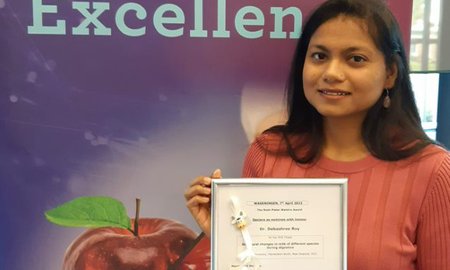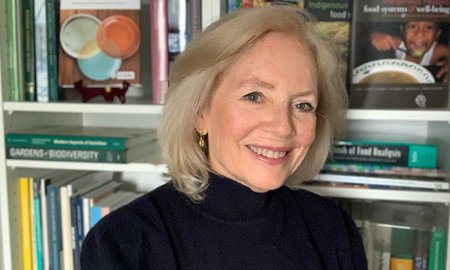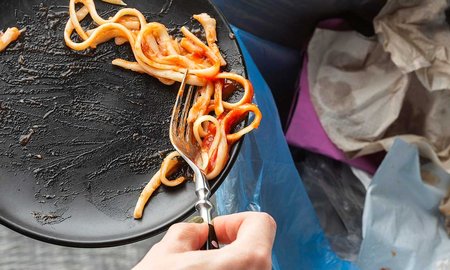
Dr Nick Smith (left) and Dr Andrew Fletcher from the Riddet Institute's Sustainable Nutrition Initiative.
Dr Andrew Fletcher and Dr Nick Smith from the Riddet Institute’s Sustainable Nutrition Initiative (SNi®) have been invited to speak at a closed meeting of global dairy industry giants and scientists in the Netherlands in June about their work on the challenge of feeding the world in a sustainable and healthy way.
Dr Smith is a Research Officer and Dr Fletcher is an Honorary Industry Fellow, both at SNI® based at the Riddet Institute, a New Zealand Centre of Research Excellence hosted by Massey University in Palmerston North.
They are two of eight speakers selected for the Utrecht Meeting, a two-day think tank held in the Netherlands every year, featuring 30 invited attendees from the world’s largest dairy companies, and selected dairy industry scientists.
Attendees at this year’s meeting, being held on June 15 and 16, will discuss healthy diets in a sustainable food system, something both researchers are well acquainted with.
“This is right in the slot for us,” Dr Smith says. “Modelling healthy diets and sustainable food systems is what we do.”
Drs Smith and Fletcher are mathematical modellers at SNi® and are part of the team that developed the DELTA Model®, a global food system mass balance which predicts how global food production measures up to the global nutrition requirements of the world’s population.
Professor Warren McNabb, who leads SNI®, says the invitation to attend the meeting is outstanding recognition of the work being done by the team on sustainable nutrition.
“It shows that we are having a real impact on the international discussion of this topic: the future of food.”
The meeting will focus on the New Zealand research, showcasing it to the dairy boards of the biggest dairy producing countries in the world.
Drs Smith and Fletcher will speak more specifically on the DELTA Model® which covers 175 countries with data obtained from the United Nation’s Food and Agriculture Organization food balance sheets and allows for a wide range of possible scenarios for feeding the global population to be explored.
“It is a chance to show off what we have done so far, but it will also provide the chance to share what we are going to do,” Dr Smith says. “The people in the room will see the results of our work perhaps earlier than others in the world, and also have a chance to shape what we do in the future through the group discussions.”
Dr Smith says the world needs to find a way to feed a growing global population without exceeding the capacity of the planet, while also providing the right nutrition for optimal health.
The SNi® undertakes research into what is possible, practical, and optimal for human nutrition in meeting this challenge. It is made up of a group of food and nutrition scientists and mathematical modellers.
“What we are doing is providing the evidence base for sustainable food systems discussions. Nutrition is of first importance here.
“Anything and everything is connected to producing and distributing food: how we are eating, what we are eating and what it’s doing for our nutrition. You cannot have a sustainable food system if you are not adequately feeding people,” he adds.
Dr Smith says there are many different approaches to achieving sustainable and nutritious food in the future, and many suggestions for what the answer may be.
“Others are taking a similar approach, but what is unique about SNi® is we are not trying to tell people what the answer is. Instead, we are about providing evidence and tools so people can have more meaningful conversations about sustainable food.”
Dr Fletcher says in addition to global food supply challenges, how individuals can eat in a highly nutritious but environmentally sustainable way themselves is another growing issue.
“It’s a very different question looking at global food production – how the world feeds the world – versus how an individual feeds themselves a healthy, sustainable diet.”
But both questions are important, and increasingly urgent. Dr Smith says sustainable nutrition is a huge talking point in Europe, particularly in wealthier nations.
“It’s becoming normal to have sustainability labels on food, called Eco-Score labels, which are like our Health Star labels, but about sustainability.”
Related news
Riddet Institute Postdoctoral Fellow receives international recognition
The Pieter Walstra Award is presented every two years and is organised by the Dutch Dairy Organisation in the spirit of Professor Walstra’s contributions to dairy science.

New Adjunct Professor appointment at the Riddet Institute
Professor Barbara Burlingame has been appointed as an Adjunct Professor by the Riddet Institute in recognition of her professional achievements and leadership in public health nutrition and food systems.

Riddet Institute model a “game-changing solution” for achieving sustainable nutrition
The Sustainable Nutrition Initiative (SNiTM), a research program in the Riddet Institute at Massey University was recently proposed as part of the contribution to the United Nations Food Systems Summit.
